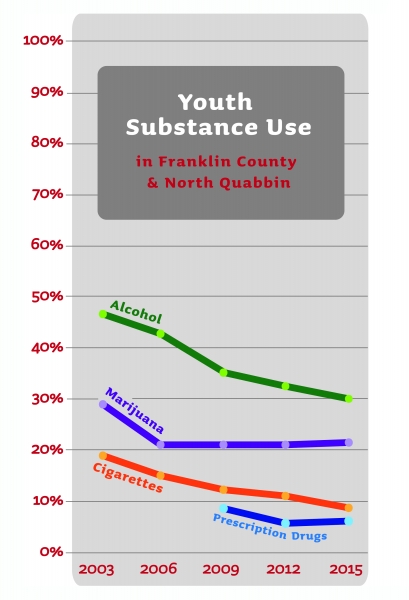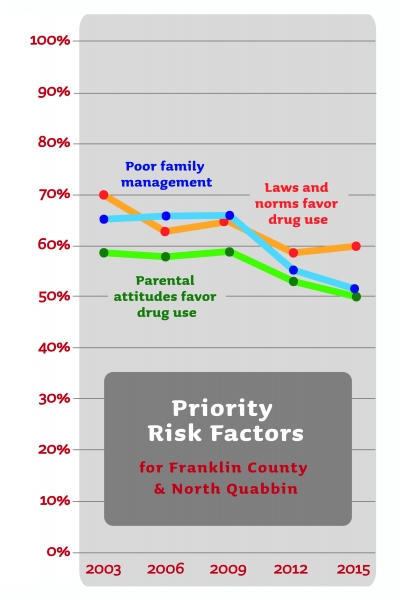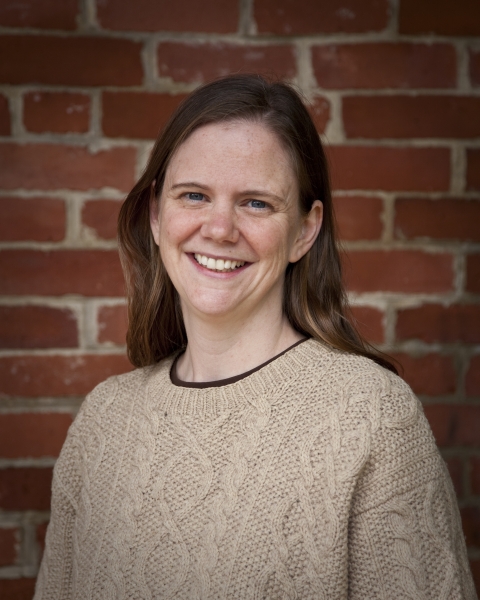Our conversation series with experienced backbone leaders continues with a conversation with Kat Allen, co-chair of Communities that Care Coalition (CTC).
CTC focuses on supporting the health and well-being of young people in Franklin County and the North Quabbin region of Massachusetts. CTC has been operating since 2002, and much can be learned from their experience and evolution. For more information on CTC, see this 6-minute video of Kat’s “practitioner insights” and a brief case study.
Over time, CTC’s results have been impressive, as summarized below (source: Kat Allen, Communities that Care Coalition).


Here are a few highlights from our conversation:
- CTC’s sustainability (they have been operating for almost 15 years) is enviable. To obtain funds needed to sustain itself, CTC expanded its focus to include nutrition and physical activity (in addition to its original focus on substance use prevention). Kat notes this broadening is in-line with CTC’s focus on youth health and wellbeing. The need to shift focus to obtain funds (while attempting to be true to the initiative’s mission) is something we hear experienced backbone leaders grapple with.
- Kat acknowledges that funding can “go away at any second.” To guard against such a disruption, CTC is very intentional about building others’ capacity and buy-in. For example, CTC focuses on building relationships by carving out part of meetings for non-working lunches.
- CTC has plans to involve youth in their strategic decisions. Kat believes youth can be tremendously powerful at the school and municipal levels.
David: Your initiative has been in place for over ten years. I think the question that most people will have for you is about funding. Can you tell me what your experience with funding for CTC has been?
 Kat: The bulk of our funding sunset after the first 10 years, so we had to get a little creative and broaden our scope to include nutrition and physical activity. We found that there was funding available in this space, whereas in substance use prevention we were hitting some bottlenecks. This expansion wasn’t mission drift because we’ve always been focused on youth health and wellbeing. Rather, it was a broadening of what we were doing to meet another need in the community.
Kat: The bulk of our funding sunset after the first 10 years, so we had to get a little creative and broaden our scope to include nutrition and physical activity. We found that there was funding available in this space, whereas in substance use prevention we were hitting some bottlenecks. This expansion wasn’t mission drift because we’ve always been focused on youth health and wellbeing. Rather, it was a broadening of what we were doing to meet another need in the community.
What system-level changes have you seen as a result of CTC’s work? (For more about what we mean by systems change in collective impact, check out FSG’s Guide to Evaluating Collective Impact.)
The biggest change is that all nine of our public school districts have been trained in an evidence-based substance use prevention curriculum, half of the districts are now implementing it, and almost all of the others are planning to implement. This is a major change and impacts all youth in the region, and we expect the programming to go on indefinitely.
CTC’s role was to review all the curricula (done by our Regional School Health Taskforce) and select the best curriculum for our districts’ needs. We then convened meetings with administrators about implementation feasibility, agreed on the final curriculum, put together the training, and brought all the schools together. We will also lead the effort on evaluating the effectiveness of the curriculum on reducing substance use. We also have plans for continuous learning by convening health teachers on a quarterly basis to share resources and adaptations to the program.
Additionally, we are helping to increase capacity in the region by building a network of substance use prevention professionals by seeking funding and mentoring other community coalitions in our area. We used to be the ony prevention professionals in the region, but now we have a whole set of colleagues all working toward the same goals.
What have you learned from these successes?
The reality is that funding can go away at any time and we have to be prepared to leave a legacy of effective strategies and population-level change. When we set up a new strategy, we are thinking about long term sustainability from the get-go. For instance, when we worked to get the LifeSkills substance abuse prevention curriculum in the schools we were not planning to teach the program ourselves, but rather worked to get teachers trained and the program institutionalized in all of our school districts. Rather than us leading the strategy and risking disappearance at some point in the future, we have built buy-in and capacity so that our stakeholders are doing the work themselves. It’s harder to do it that way, but it’s so essential and it will be more effective in the long-run. That way, if CTC disappears tomorrow, then that strategy will continue.
We also found that if the teachers feel like they are part of a larger network and there is an expectation to engage in the work, then that creates accountability and there is more likelihood of success. One simple way we build this network is to create space and time for relationship building. Whenever we have CTC meetings, we always have a non-working lunch and time for networking built into the agenda.
There are many collective impact initiatives that focus on youth. How have you engaged youth in your work?
This is one area that I am really excited about. To date, we have some youth involved in specific strategies, but I would not say that we’ve had strong youth involvement. But we’ve just voted on seeking funding for a new youth involvement initiative where one of our host agencies (Community Action Youth Programs) will take the lead on connecting all of the wonderful youth groups that already exist in our region, linking them more formally with the Coalition, providing leadership development and training, and getting these groups involved in local advocacy work. We have community and school policy changes on the horizon, and we think that youth can be tremendous advocates on a municipal and school level, and they can gain skills and feel empowered by getting involved.
What do you think? Share your questions and comments below.
